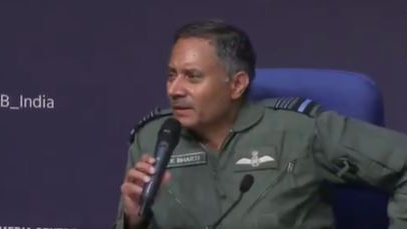

New Delhi, May 11: Significant damage was inflicted on Pakistan’s military infrastructure during India’s precision strikes under Operation Sindoor, with the Pakistan Air Force’s Nur Khan base in Chaklala suffering heavy destruction and the runway at Rahim Yar Khan airbase flattened, according to defence sources.
DG Air Operations, Air Marshal A.K. Bharti, revealed that multiple Pakistani airbases — including Chaklala, Rafiqui, Rahim Yar Khan, Sargodha, Bhulari, and Jacobabad — were targeted, marking a rare and strategic achievement that brought Pakistan to its knees.
The operation, launched in the early hours of May 7, was a calculated response to the April 22 terror attack in Pahalgam, Jammu and Kashmir, which killed 26 civilians, including a Nepali national. The Indian Armed Forces targeted nine terrorist infrastructure sites across Pakistan and Pakistan-occupied Jammu and Kashmir (PoK).
Air Marshal A.K. Bharti elaborated on the planning and execution of the operation, stating, “We carefully selected the targets. Among the nine, we focused on the notorious training camps at Behbalpur and Muridike, located deep within Pakistani territory. Through critical target system analysis, we identified how best to neutralize them with air-to-surface guided munitions—ensuring precision and minimal collateral damage.”
He also addressed the retaliation faced by India, revealing that Pakistani unmanned aerial vehicles (UAVs) and small drones launched multiple waves of attacks on the evening of May 7, targeting both civilian and military sites. “All UAVs were successfully intercepted, and while a few drones did land, they caused minimal damage. Our hard kill and soft kill counter-UAV systems performed effectively,” he said.
He emphasized a key difference in the nature of the operations: “India targeted terrorist infrastructure, while the adversary deliberately attacked civilians and military installations. This demanded a decisive response.”
When asked about the downing of Pakistani aircraft, Air Marshal Bharti stated, “Their planes were prevented from breaching our airspace. We don’t possess wreckage, but we can confirm that several enemy aircraft were downed. I won’t speculate on numbers at this time, but technical analysis is underway.”
Following the strikes, tensions escalated with intensified cross-border shelling from Pakistan and strong retaliatory actions by India. Border regions remained on high alert, often experiencing blackouts during Pakistani attacks.
In a surprising diplomatic turn, Pakistan’s Director General of Military Operations (DGMO) reached out to his Indian counterpart at 3:35 p.m. on May 7, proposing a ceasefire. India agreed, and the ceasefire took effect at 5:00 p.m. IST. However, before any official statement from either country, U.S. President Donald Trump tweeted about the ceasefire at 5:25 p.m., followed by U.S. Secretary of State Marco Rubio’s announcement of planned talks at a "neutral site."
India has maintained that the decision to halt hostilities was made independently. On Saturday, Foreign Secretary Vikram Misri confirmed that both DGMOs had agreed to cease all military actions—on land, at sea, and in the air—from the agreed time.